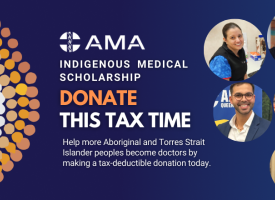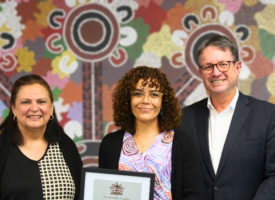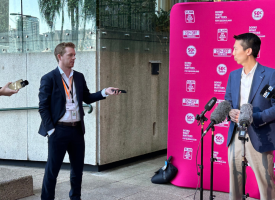Time to set a national target for closing the gap in the rates of Aboriginal and Torres Strait Islander imprisonment
AMA Indigenous Health Report Card 2015
“Treating the high rates of imprisonment of Aboriginal and Torres Strait Islander peoples as a symptom of the health gap: an integrated approach to both”
The AMA today called on all Australian governments to commit to setting a target for closing the gap in the rates of Aboriginal and Torres Strait Islander imprisonment.
AMA President, Professor Brian Owler, said that the alarmingly high and increasing rates of Indigenous incarceration – and the devastating effects that imprisonment has on the lifelong health of Aboriginal and Torres Strait Islander people who spend time in prison – are highlighted in the latest AMA Indigenous Health Report Card.
The AMA Report Card – Treating the high rates of imprisonment of Aboriginal and Torres Strait Islander peoples as a symptom of the health gap: an integrated approach to both – was launched this morning by the Minister for Rural Health, Senator Fiona Nash, at Parliament House in Canberra. Senator Nash has portfolio responsibility for Indigenous health.
Professor Owler said that Aboriginal and Torres Strait Islander people continue to be failed by both the health and justice systems.
“Aboriginal and Torres Strait Islander people continue to experience a life expectancy of around ten years less than non-Indigenous people, and are significantly over-represented in custodial settings,” Professor Owler said.
“Aboriginal and Torres Strait Islander people comprise 27 per cent of all sentenced prisoners, and 29 per cent of people awaiting sentencing.
“They are 13 times more likely to be imprisoned than their non-Indigenous peers.
“The imprisonment of Aboriginal and Torres Strait Islander people is rising, and the situation is only going to get worse unless we take immediate action.
“It is projected that more than 10,000 Indigenous people, including over 1000 Aboriginal and Torres Strait Islander women, will be in custody on the night of the annual prison census on 30 June 2016.
“The situation for young Indigenous people is even more distressing.
“In 2012-13, Aboriginal and Torres Strait Islander 10 to 17 year-olds were 17 times more likely to have been under youth supervision than their non-Indigenous peers. This is unacceptable.
“Our Report Card recognises that shorter life expectancy and poorer overall health for Indigenous Australians is most definitely linked to prison and incarceration.
“We understand the complex drivers of imprisonment in any individual’s case, but we also understand that the ‘imprisonment gap’ is symptomatic of the health gap.
“We believe that it’s possible to isolate particular health issues – notably mental health conditions, alcohol and other drug use, substance abuse disorders, and cognitive disabilities – as among the most significant drivers of the imprisonment of Aboriginal and Torres Strait Islander peoples.
“These health issues must be targeted as a part of an integrated effort to reduce Indigenous imprisonment rates.
“The high rates of imprisonment and resultant health problems among Aboriginal and Torres Strait Islander people should be a priority social justice and human rights issue – not just a health issue – in this country.”
The AMA Indigenous Health Report Card 2015 makes the following recommendations:
- set a national target for closing the gap in the rates of Aboriginal and Torres Strait Islander imprisonment;
- adopt a justice reinvestment approach to fund services that will divert Aboriginal and Torres Strait Islander people from prison;
- develop service models to support the expansion of Aboriginal Community Controlled Health Organisations (ACCHOs) and other services as part of an integrated approach to improving the health of Aboriginal and Torres Strait Islander peoples in the community (including responding to mental health conditions, substance use disorders, and cognitive disabilities, based on need), and as a preventative measure to reduce imprisonment rates;
- in partnership with the ACCHOs, prison health services, and other services as appropriate, develop a model of health care that integrates ACCHOs, prison health services, and other services to deliver an integrated approach to service provision that aims to improve health and reduce imprisonment rates at the same time; and
- employ Aboriginal Health Workers and Indigenous health professionals in prison health services to support them to deliver a culturally competent health service.
The AMA Indigenous Health Report Card 2015 is available at https://ama.com.au/2015-ama-report-card-indigenous-health-closing-gap-indigenous-imprisonment-rates
25 November 2015
CONTACT: John Flannery 02 6270 5477 / 0419 494 761
Kirsty Waterford 02 6270 5464 / 0427 209 753
Follow the AMA Media on Twitter: http://twitter.com/ama_media
Follow the AMA President on Twitter: http://twitter.com/amapresident
Follow Australian Medicine on Twitter: https://twitter.com/amaausmed
Like the AMA on Facebook https://www.facebook.com/AustralianMedicalAssociation



